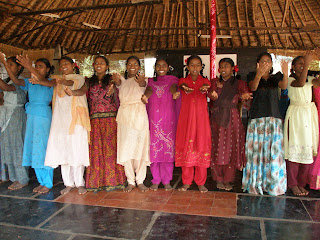Yesterday Ambryn and I had the wonderful opportunity to accompany a woman from a German NGO, Kinder Not Hilfe, a partner of Visthar, in a sort of "tour" of Visthar and the Bandhavi program in particular. We learned a lot about Dr. B.R. Ambedkar, a champion of the Dalit (untouchable) liberation movement (and an author of the Indian constitution), when we were here with the SJP program in 2001. Yesterday we were reminded of one of his more famous statements which has directed the mission of Visthar: "My final words of advice to you are to educate, agitate and organize. Have faith in yourself. With justice on our side I do not see how we can lose our battle...For ours is a battle not for wealth or for power. It is a battle for freedom. It is a battle for the reclamation of human personality. The battle is in the fullest sense spiritual."
For those of you who are not familiar with Visthar, it is a support NGO based on equity, justice, and peace and the foundational values of all religions. They are committed to the transformation of individuals and communities toward just peace. They work for people-centered advocacy and peace and development education. "To care, to create, to celebrate and reclaim the Earth for us all." The Bandhavi program is a strategic intervention for the abolition of the Devadasi system.
Devadasis are women dedicated to the goddess Yellema who essentially become prostitutes in the temple. Being intimate with them is seen as being intimate with the goddess. The girls in the Bandhavi program come from dalit communities where they are at risk of becoming dedicated. There are many superstitious beliefs that if a girl is not dedicated she (and her family) will be haunted by the goddess, etc. Visthar works with partner organizations in the girls' home communities to identify families with a willingness to give their girls a chance at greater life.
For those of you who are not familiar with Visthar, it is a support NGO based on equity, justice, and peace and the foundational values of all religions. They are committed to the transformation of individuals and communities toward just peace. They work for people-centered advocacy and peace and development education. "To care, to create, to celebrate and reclaim the Earth for us all." The Bandhavi program is a strategic intervention for the abolition of the Devadasi system.
Devadasis are women dedicated to the goddess Yellema who essentially become prostitutes in the temple. Being intimate with them is seen as being intimate with the goddess. The girls in the Bandhavi program come from dalit communities where they are at risk of becoming dedicated. There are many superstitious beliefs that if a girl is not dedicated she (and her family) will be haunted by the goddess, etc. Visthar works with partner organizations in the girls' home communities to identify families with a willingness to give their girls a chance at greater life.
At Visthar, the girls (ages 8-16) live in community and attend school. They are also trained in several vocations and "electives", with an emphasis on the traditions of their home communities: theater, dance, animal husbandry, medicinal herbs, agriculture, yoga, paper-making, tailoring, computers. They follow a sort of "liberal arts" model of education. Our time with the girls has been inspiring, to say the least. We have done yoga with them the last two mornings (at 6:00am) and enjoy conversing with them throughout the day. ("Hi Auntie!") They are brave, creative, and bright. They have a strong desire to change the unjust system into which they were born. My words cannot describe the potential of this program, the intention behind it, or the spirit of these phenomonal girls. Here is a short video clip of their presentation:
In the past three days we have assisted Mercy, associate director of Visthar, in preparing for a conference Visthar is hosting next week, "Gender, Conflicts and Disasters in South Asia." We will continue to help prepare this week, will participate next week, and simultaneously will work out a curriculum of English and dance, which we will teach to the girls. Tomorrow we begin Kannada (the state language of Karnataka) lessons! We are very excited.
Last night Mercy brought us into downtown Bangalore. We purused a few shops (including a very trendy, yet very Indian organic-esque clothing and housewares shop), had orange-ginger juice, puris and samosas. We ended the evening with dinner at the home of Sateesh, who works in the Bangalore office of Kinder Not Hilfe, and his large family. It was our first time in an Indian home this trip. The familiarity of the "Indian home" was very comforting. At lunch today we were invited to a family party of another Visthar staff member, Christine. I am astounded by the hospitality and generosity we have experienced thus far.


No comments:
Post a Comment